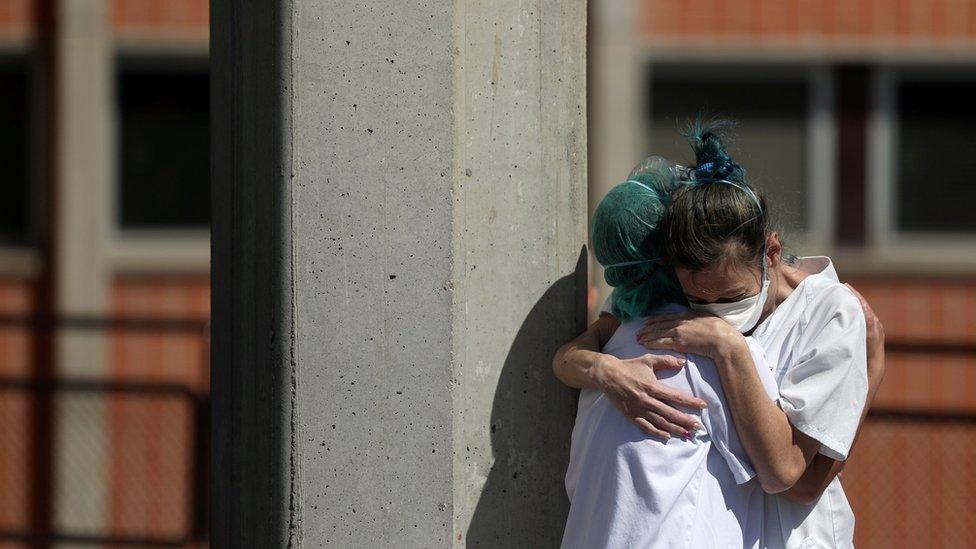Coronavirus: Deaths rise sharply in Spain while infection rate stabilises
- Published

Spain's health system has been under intense pressure as infections continue to rise
Spain has seen a sharp rise in the number of deaths caused by coronavirus but the rate of new infections is stabilising, officials say.
Confirmed cases of Covid-19, the disease caused by the virus, rose to 64,059, a 14% increase compared with 18% a day earlier and 20% on Wednesday.
In 24 hours, 769 people died, a daily record, taking the total to 4,858.
Nursing home residents are particularly affected. Spain is Europe's second-worst-hit country after Italy.
The Spanish government has extended the state of emergency until at least 12 April. People's movement are severely restricted and most shops and businesses closed.
The latest figures raised hopes that the measures were beginning to take effect. Health emergency chief Fernando Simón said they showed a "clear stabilisation" and that it seemed they were "approaching the long-awaited peak".
Across the country, the army has been deployed to deep-clean hospitals and other facilities - including some 900 nursing homes where at least 1,517 deaths have been recorded.
Hospitals have been under intense pressure, and the number of confirmed cases included 9,444 health workers. For days, doctors, nurses and other frontline personnel have complained of inadequate protective equipment.
Meanwhile, the health ministry said some 9,000 rapid diagnostic tests imported from China had proved defective. Their use has been suspended, it said.

LIVE UPDATES: US overtakes China with most cases
A SIMPLE GUIDE: What are the symptoms?
AVOIDING CONTACT: Should I self-isolate?
VIDEO: The 20-second hand wash

What is happening elsewhere in Europe?
On Friday Italy reported 969 new deaths - a record - bringing the total of deaths from Covid-19 in the country to 9,134. The number of cases rose by almost 6,000 to 86,498.
The country was the first in the West to impose sweeping restrictions on people's movement and, on Friday, authorities warned they were likely to be extended beyond 3 April.
In France, Prime Minister Édouard Philippe raised the alarm over an "extremely high wave" of new infections, saying the epidemic that started in the east was now in the Paris region.
Hospitals could reach saturation point around the capital within 24 to 48 hours, the Hospital Federation of France said. Some 1.2 million residents in the Paris area have left in the past week, according to data analysed by mobile phone company Orange.
The country had 29,155 confirmed cases and 1,696 deaths as of Thursday. Julie A, 16, became France's youngest victim of the virus, with her sister Manon telling Le Parisien newspaper: "We've got to stop thinking this only affects the elderly. No-one is invincible against this mutant virus".

Can EU get a grip on crisis?

"The EU is finished," gloat the naysayers. "Even faced with the coronavirus, its members can't stick together." Certainly EU leaders meeting on Thursday - by socially-distant video conference - glaringly failed to agree to share the debt they are all racking up fighting Covid-19.
From her flat in Berlin, where she is self-isolating after her doctor tested positive for the virus, German Chancellor Angela Merkel openly admitted to the disharmony over financial instruments.
What leaders did agree on was asking Eurogroup finance ministers to explore the subject further, reporting back in two weeks' time. Two weeks. The EU is famous for kicking difficult decisions down the road but in coronavirus terms, with spiralling infection and death rates, two weeks feels like an eternity.
For ordinary people, frightened for their health, the safety of their loved ones, worrying about their rent and feeding their family after businesses shut down, the idea that leaders spent six hours squabbling over the wording of their summit conclusions in order to defer a decision over funds, will be incomprehensible.

What is happening around the world?
The US became the country with the largest number of confirmed cases, with more than 85,500 positive tests. Some 1,300 people have died nationwide from Covid-19. On Thursday, President Donald Trump said his team plans to release federal social distancing guidelines that may advise some regions to loosen restrictions
New York City is the current coronavirus epicentre in the US but there were signs the disease was rapidly spreading in New Orleans, Chicago and Detroit, where the mayor described the situation as "really concerning"
Why staying at home in is a matter of life and death
China, where the outbreak began in December, announced a temporary ban on all foreign visitors, even if they have visas or residence permits. There have been 3,292 deaths and 81,340 confirmed cases in the country, and the majority of recent new cases have come from abroad
In the UK, Prime Minister Boris Johnson confirmed he had tested positive for coronavirus, saying he had developed only "mild symptoms". He was self-isolating in Downing Street but said he would "continue to lead the government's response via video-conference as we fight this virus"
According to a tally by Johns Hopkins University, there were more than 540,000 confirmed cases of coronavirus around the world, external and 24,000 deaths. Some 124,000 people have recovered